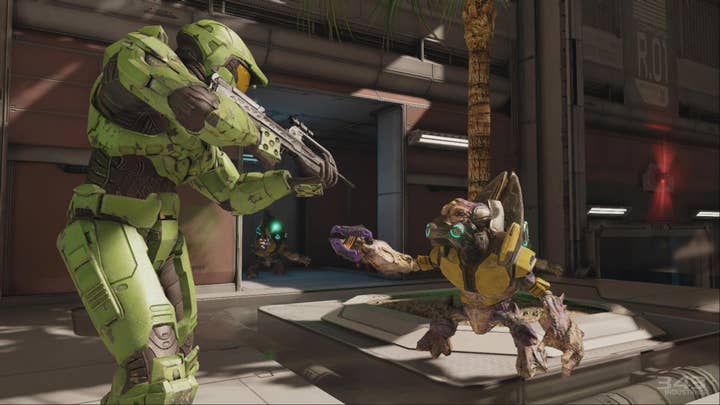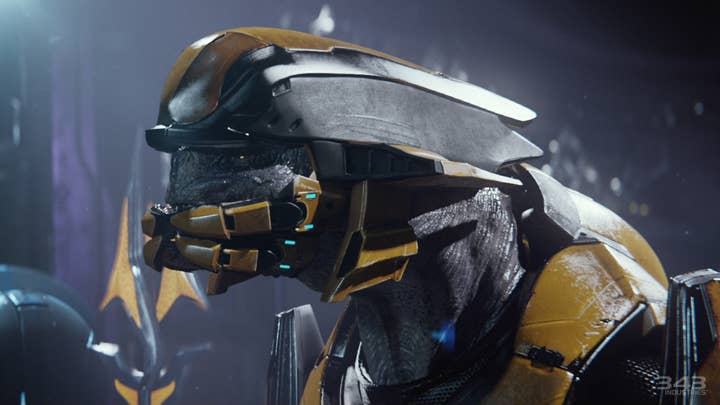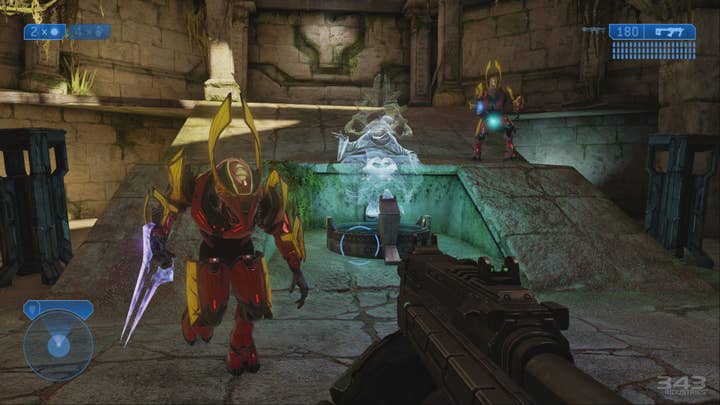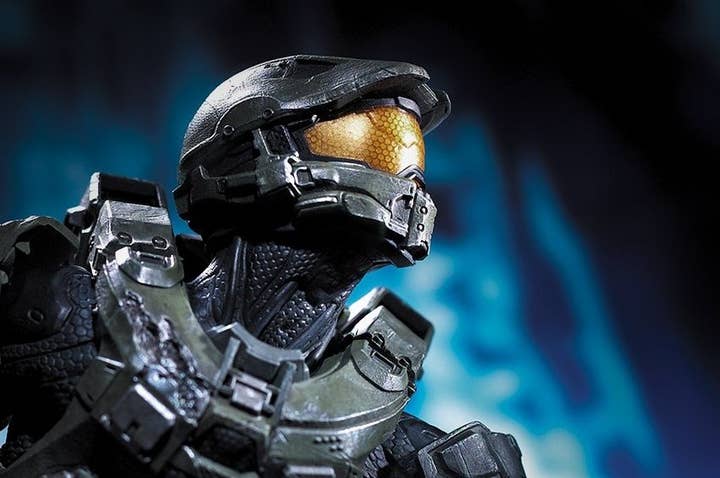Critical Consensus: The Master Chief Collection is a slice of gaming history
343 Industries sets a new bar for HD remakes, though some critics are impatient for Halo 5
If there was ever a time when remakes were considered a novelty in video games it has long since passed. Rebooting, reimagining and numerous other forms of creative resurrection are now a common feature of any given year, reaching a near nonsensical crescendo in 2014 with the "HD Remastered" version of Naughty Dog's The Last of Us and the "Definitive Edition" of Crystal Dynamics' Tomb Raider. Both were launched within a year of their original releases, and both were targeted at reticent consumers whose priorities had already shifted to the next generation of consoles. Repeat purchases were, of course, very welcome indeed.
For the most part, though, remakes feed on and celebrate nostalgia, and Microsoft's Halo: The Master Chief collection may be the most lavish attempt to do so in gaming's history. This is Halo: Combat Evolved, Halo 2, Halo 3 and Halo 4, all running in (near enough) 1080p at 60fps, complete with their original multiplayer modes. Halo 2, arguably the foundation on which Xbox Live was built, is the major focus here, with additional content in its multiplayer and more time and resources invested in the remake of its campaign. At the time of writing, this bountiful package was the highest-rated Xbox One release on Metacritic.
"At the time of writing, this bountiful package was the highest-rated Xbox One release on Metacritic"
This creates a problem for the critics. On the one hand, they can't neglect the responsibility to assess and rate The Master Chief Collection as they would any other premium-priced software. On the other, doing so seems almost irrelevant when one contemplates the reason why this piece of software exists at all. Shacknews largely sticks to the first point, with a relatively cool appraisal that focuses on "a host of niggles" found throughout the collection's different parts. The save systems in the early Halo games lack the frictionless, check-pointed autosaving found in the games of today. If the settings are adjusted in one Halo game, those changes don't automatically apply to the settings in others.
The most telling criticism is applied to the Playlists, which allow users to complete curated sequences of missions drawn from all four games in the collection. This freedom to switch between games is a major selling point for The Master Chief Collection, and yet 343 Industries hasn't given its players the ability to create their own Playlists.

"The idea of allowing users to make their own playlists seems so obvious, and even easy enough to support as a social feature," Shacknews states. "Letting users make their own compilations of Halo memories would lend this compilation some serious longevity, and the lack of it feels like a missed opportunity to encourage fans to share their own favourite memories."
Ars Technica goes one step further, taking a few paragraphs at the start of its review to ponder the idea The Master Chief Collection is a cynical attempt to give its stumbling new console a boost, filling the long wait between now and the release of 343 Industries' next full Halo game.
"It is part of a growing appreciation of the past in a medium which until recently was resolutely forward-looking"
Eurogamer
"Quick, put together a Halo compilation, stat!" Ars Technica jokes. "Microsoft, of course, wants us to think we're getting one helluva bargain here, even though each game's 'complete' edition can be found for pennies on the dollar on their original platforms.
"In good news, we can report that the developers assigned to this Halo remembrance project didn't keel over due to the stress of managing ten simultaneous remastering projects (between the various single and multiplayer modes available). And just because Master Chief Collection is a somewhat obvious cash-in project in the Xbox era's most dire hour doesn't negate its worth by default."
In general, Ars Technica is complimentary about 343's work here, but it seems unimpressed with the endeavour itself. One of The Master Chief Collection's features is the ability to switch, almost instantaneously, from the souped-up version of Halo or Halo 2 to its creaking, archaic original. Internally, 343 no doubt thought this would be a crowd-pleaser. Not so for Ars Technica.
"Perhaps Microsoft wanted to prove that the original game experience has been left intact. Perhaps they really thought the switcheroo was a worthwhile gimmick for the sake of oohs and ahhs.

"Still, we wonder how much more potent this year's anniversary update could have turned out without being tied down to the original engine... We would have loved to see a new particle effects system or a significant leap in lighting tech. Instead, we get to replay a serviceably smoothed-out Halo 2, running as if it were on an Xbox 360 with more RAM."
In one sense, that's a fair reading, acknowledging certain limitations that the nature of The Master Chief Collection imposed on its developer. However, both Ars Technica and Shacknews veered away from a crucial point that served as the very foundation of reviews from several influential websites. There are almost certainly ways that 343 Industries could have released these games in even more technically impressive versions, but placing Halo back on the cutting edge was never the idea. The fact that all of these games are playable side by side isn't a failing - it's the entire point
"Microsoft wants us to think we're getting one helluva bargain here"
Ars Technica
By contrast, Eurogamer calls the epoch-shifting effect of switching between each game's different versions, "extraordinary."
"Digital Foundry expressed frustration that the ability to switch between visuals comes at the expense of full 1080p output, but for me that ability is crucial to what the Collection is trying to achieve. It's a source of constant astonishment to have our pristine HD memories directly contrasted with real HD, and during my campaign playthrough I've found myself regularly lost for minutes at a time, spiralling and panning in deadly battlefields and ancient structures, marvelling stupidly at the difference.
"The Master Chief Collection is, above all, an act of curation. There's something exhibit-like and deeply impressive about seeing Halos one through four lined up in the same menu system - not separated into discrete applications, but linked through a tidy and sophisticated interface that brings everything together and, as far as possible, standardises the Chief's adventure.
"It is part of a growing appreciation of the past in a medium which until recently was resolutely forward-looking."

Polygon takes a similar view, baldly stating its case in the opening sentence of its 9.5 out of 10 review: "Halo: The Master Chief Collection is a historical document." And not just for the Halo series specifically, but for a huge chunk of the evolution of first-person shooter design. It places key innovations in their particular context, while simultaneously allowing players to isolate and understand the ways the genre has changed overall. This sort of treatment is very common in film, literature and other forms of art and culture, and Eurogamer and Polygon are right to point out that it's a relatively new concept in games.
"The Master Chief Collection sets a bar that other remasters and collections will have difficulty reaching, much less topping"
Polygon
Indeed, one of Polygon's precious few criticisms of The Master Chief Collection is almost the mirror opposite of Ars Technica: that 343 Industries didn't go far enough prioritised bringing the games up-to-date over the sort of additional material that would have made their place in history easier to grasp and appreciate.
"There's a distinct lack of making-of and documentary content, which is surprising, given how meticulously watched and tracked the makings of Halo 2, Halo 3 and Halo 4 were. There's a cornucopia of collector's edition content that shipped with those games that's nowhere to be found here.
"There is a new documentary for the creation of Halo 2: Anniversary, which reveals some previously undisclosed, fun bits of trivia... But the kinds of unvarnished, unflattering explorations of Halo 2's development that were present even in the 2004 documentary that accompanied its Collector's Edition are nowhere to be found, and are missed.
"Ultimately, these issues are small nicks in an otherwise intimidating facade. Halo: The Master Chief Collection sets a bar that other remasters and collections will have difficulty reaching, much less topping."

